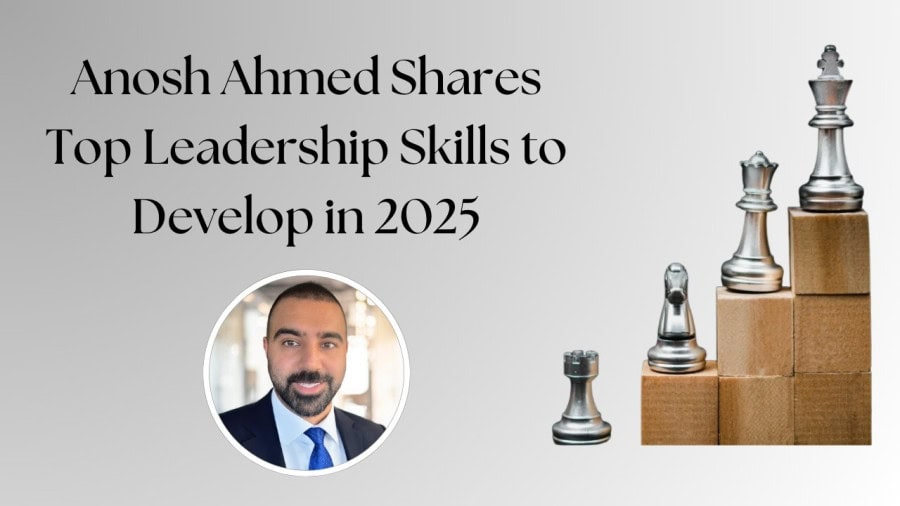Leadership in 2025 demands more than just experience, it requires a forward-thinking mindset, adaptability, and a deep understanding of emerging trends. Dr. Anosh Ahmed, renowned physician, entrepreneur, and author of Leadership 101, emphasizes that leaders who thrive in this new era will be those who embrace change, foster innovation, and prioritize human connection.
Think about the rapid changes we’ve witnessed in the workplace over the last decade. Hybrid work models, digital transformation, and shifting employee expectations have rewritten the rulebook on leadership. According to Anosh Ahmed, leaders in 2025 must not only adapt to these changes but also anticipate future challenges.
“The pace of change isn’t slowing down,” says Anosh Dr. Anosh Ahmed. “Leaders need to focus on developing skills that go beyond technical expertise. They need to connect with people, inspire innovation, and build resilient teams.”
So, what are the top leadership skills to focus on in 2025? Dr. Ahmed outlines key traits and strategies that every leader should prioritize.
1. Emotional Intelligence: The Foundation of Leadership Excellence
Employees are not just looking for a boss, they want a leader who understands and values them. Emotional intelligence (EQ) remains a cornerstone of effective leadership.
AnoshDr. Ahmed explains, “Leaders with high emotional intelligence can navigate complex interpersonal dynamics, resolve conflicts, and create a culture of trust.” Developing EQ involves active listening, empathy, and the ability to manage emotions in high-pressure situations. As workplace stress and mental health concerns rise, leaders who can foster emotional well-being will stand out.
2. Adaptability: Thriving in Uncertainty
If the past few years have taught us anything, it’s that adaptability is non-negotiable. Leaders must be prepared to pivot quickly in response to market changes, technological disruptions, or unexpected challenges.
“Adaptability isn’t just about reacting to change; it’s about anticipating it,” says Dr. Anosh Ahmed. He advises leaders to cultivate a growth mindset and stay open to learning new skills. This proactive approach will enable them to stay ahead in an ever-evolving landscape.
3. Tech Savviness: Embracing Digital Transformation
The digital revolution shows no signs of slowing down, and leaders who fail to keep up risk being left behind. From artificial intelligence to data analytics, understanding technology’s role in business is crucial.
Dr. Ahmed recommends that leaders familiarize themselves with emerging tools and technologies, not to become experts, but to make informed decisions. “A tech-savvy leader can identify opportunities for innovation and empower their teams to leverage technology effectively,” he explains.
4. Inclusive Leadership: Building Diverse and Equitable Teams
Diversity, equity, and inclusion (DEI) are no longer optional, they are essential for creating a thriving workplace. Leaders in 2025 must prioritize building diverse teams and fostering an inclusive culture where everyone feels valued.
Dr. Ahmed emphasizes that inclusive leadership goes beyond hiring practices. “It’s about listening to different perspectives, addressing biases, and creating opportunities for all employees to succeed,” he says.
5. Visionary Thinking: Leading with Purpose
In a world where employees crave purpose, leaders must articulate a clear vision that inspires and motivates. Dr. Ahmed advises leaders to align organizational goals with personal and team values.
“Visionary leaders don’t just set goals; they create a sense of meaning,” he says. By tying day-to-day tasks to a bigger purpose, leaders can foster engagement and drive results.
6. Strong Communication Skills: The Power of Connection
Effective communication remains one of the most critical leadership skills. Whether it’s motivating a team, resolving conflicts, or sharing a vision, the ability to communicate clearly and authentically is key.
Dr. Ahmed suggests that leaders prioritize transparency and active listening. “Strong communication builds trust, and trust is the foundation of any successful team,” he explains.
7. Coaching and Mentorship: Empowering the Next Generation
The leaders of tomorrow are shaped by the mentors of today. Dr. Ahmed highlights the importance of investing in team development through coaching and mentorship.
“Great leaders empower others to lead,” he says. “By sharing knowledge and providing support, you can create a legacy of leadership excellence.”
8. Resilience: Leading Through Challenges
Resilience is more than just bouncing back from setbacks, it’s about growing stronger through adversity. Anosh Ahmed advises leaders to build resilience by focusing on self-care, seeking support when needed, and maintaining a positive outlook.
“Leadership isn’t always easy, but resilient leaders inspire confidence and stability in their teams,” he notes.
9. Innovation: Challenging the Status Quo
Innovation isn’t just about new products or services; it’s about creating an environment where creativity thrives. Anosh Ahmed encourages leaders to challenge the status quo, encourage experimentation, and celebrate innovative ideas.
“Innovation happens when leaders create a safe space for their teams to take risks and think outside the box,” he says.
Excelling at Leadership in 2025
As we move further into 2025, the role of leaders will continue to evolve. Anosh Ahmed’s insights provide a roadmap for those who want to stay ahead in this dynamic environment. By focusing on emotional intelligence, adaptability, inclusivity, and other key skills, leaders can not only navigate change but also inspire their teams to reach new heights.
“Leadership is about more than managing tasks; it’s about empowering people and driving meaningful change,” says Dr. Ahmed. For those committed to growth, these skills are not just optional, they are essential.
The future of leadership is here. Are you ready to lead it?










